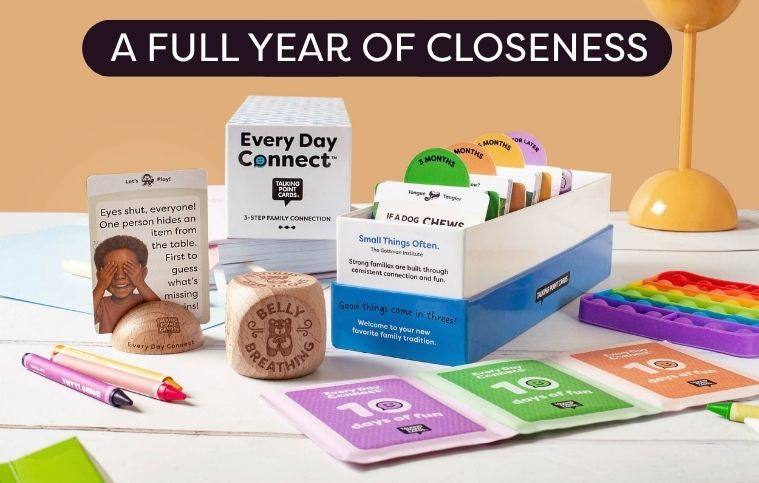SHOP
About
Family Communication 101
Tips for More Effective and Meaningful Conversations

You know that feeling when a family gathering is going really well—when everyone's laughing, stories are being told, and there's just this warmth and connection in the air? Those are the moments that make being part of a family so freakin' amazing.
But then there are the other times... The awkward silences. The unintentional insults. The misunderstandings that grow into full-blown arguments. Communicating effectively with family can be hard, especially when you factor in all of the different personalities, expectations, and childhood baggages rolled into one zany family system.
If you've ever found yourself thinking, "Why is it so difficult for my normally chill aunt to not take everything as a personal attack?" or "How can I get my teenaged kids to actually talk to me about what's going on in their life?", well, this article is for you.
We're going to dive into some super practical tips to help make your family conversations more effective, meaningful, and maybe even a little bit fun. Let's get started!
Don't: Start conversations when tensions are high
This is Communication 101 but it's so easy to forget in the heat of the moment. If there are already high emotions or an argument brewing, that's probably not the best time to try having a deep, productive conversation about someone's feelings or a major issue.
In those heated moments, everyone's feeling defensive and reactive. Important context gets forgotten, voices get raised, assumptions get made, and before you know it, what could have been a minor thing has escalated into a full-on family feud. So to set yourself up for more success...
Do: Look for cooler moments to start important conversations
When is the last time you had a great, productive argument while you were both already angry? Probably never.
So instead of trying to resolve things when the negativity is at a boiling point, look for calmer moments when people are more relaxed and open to listening. Go for a walk with your sister when she seems receptive, or grab your moody teenager for some one-on-one time when they've had a chance to decompress after school.
By waiting for a cooler time, you give everyone's emotional brains a chance to go off de-con 4 threat level, which makes it easier to speak and listen with more presence and empathy.
Don't: Make assumptions about what the other person thinks or feels
Whooooboy is this one a classic family communication fail. Raise your hand if you've ever been in one of these explosive conversations:
YOU: Sarah, why did you have to [thing they did]?
SARAH: What are you talking about? I didn't [thing they did]!
YOU: Yes you did! You're just too [negative character trait] to admit it.
3 hours of arguing later...
This is what happens when we fill in the gaps of what we don't understand about someone else's experience—with our own version of the "truth." And it only breeds further separation and misunderstanding.
Do: Ask questions to better understand where the other person is coming from
It's so simple, but so powerful: If you're unsure about someone's experience or reasoning behind something, just ask them!
Instead of jumping to conclusions about what someone thinks, feels, or Why they did a certain thing, get curious. Ask open-ended questions that allow the person to explain their perspective and mental experience in their own words.
A few examples:
-
"Hey mom, I noticed you seemed frustrated when Uncle Jerry started talking about his retirement plans. What were you feeling in that moment?"
-
"Dad, can you share your thought process behind making that comment about my career path?"
-
"Jayden, I'm picking up some tension from you today—what's been on your mind?"
When you lead with curiosity instead of attacks or assumptions, it diffuses those initial defenses and creates an opportunity for some real understanding to occur.
Do: Have more one-on-one conversations
Group family conversations are great for bonding and fun banter, but they make it way harder for everyone to feel truly heard and understood on a deeper level. When sensitive topics or personal issues come up in a group, people tend to clam up to avoid feeling judged or misunderstood in front of everyone else.
That's why more intimate one-on-one conversations are so valuable. With just two people, both feel safer to be more open, honest, and vulnerable. There's no audience to perform for, so you can really connect on a human level.
So while the dynamic group hangouts are amazing, try to also prioritize intentional one-on-one time with each member of your family—whether that's your partner, kids, siblings, parents, etc. Those private conversations help build the trust and mutual understanding that make the group conversations richer as well.
Do: Talk about talks (i.e. set communication boundaries and expectations)
Every family has their own unique style and norms around communication. Some families are more stoic and reserved in how they express emotions, while others are very open and blunt (sometimes to a fault). Either way, those unspoken rules can lead to a lot of complications if they're not ever talked about.
That's why it can be really powerful for a family to have an explicit "talk about talks" every now and then. This is a time to get on the same page about...
-
How you want to communicate frustrations, concerns, etc. as a family ("We agree to talk about issues directly and not do sneaky passive-aggressive comments or silent treatments.")
-
What treatments or tones are considered unacceptable ("No yelling, name-calling, or cursing at each other during disagreements.")
-
How you want to recover from communication breakdowns ("If we get into an argument and need a breather, we'll agree to take a 30-minute break before regrouping to talk it through calmly.")
By aligning around some shared communication boundaries and expectations, it's like you collectively define the "rules" to help family discussions be more constructive and less damaging.
Don't: Try to "win" arguments or prove the other person wrong
Look, we've all been there. You think you're right about something and the other person is just being impossible, so you go for the jugular with "the facts" and try to decimate their silly argument.
Maybe you "win" that particular argument... but ultimately you actually lose, because petty "I'm right, you're wrong" battles only breed more resentment and disconnection. Not exactly the goal of a tight family bond.
Do: Come from a place of curiosity, care, and attempt to truly understand
"Winning" shouldn't be the point. The true "wins" come when both people feel heard, understood and cared about. So even if you disagree with the other person's stance, try to hear the deeper needs and perspectives underlying their position.
Come from a place of empathy and care. Assume there's no ill intent behind their viewpoint, just a different set of experiences and lenses that you haven't fully understood yet. Then aim to understand instead of attacking. You just might find that their perspective has some validity—or at minimum, you'll have strengthened the relationship by fighting for understanding instead of fighting each other.
Bonus Tip: Use (but don't abuse) hypothetical questions and metaphors
One helpful communication tool is using hypothetical questions and metaphors to explore sensitive topics with a bit more psychological distance. You essentially reframe the discussion slightly by comparing it to an imaginary situation or a different context, which makes it feel a bit safer and lower-stakes to vulnerably discuss.
For example, if you're having trouble getting your teenagers to open up about an issue, you could say something like:
"If you had a friend who was going through the same thing you're dealing with, how would you advise them to handle it?"
Or if a loved one has done something to hurt you, instead of accusing them directly from the jump, you could say:
"Hey mom, let's say someone yelled at their kid for making a mistake that wasn't actually their fault. How do you think that would make the kid feel? What might be a better approach?"
Obviously these tactics only work if you're genuinely trying to have a thoughtful discussion and not just manipulatively dancing around the real issue. Use metaphors and hypotheticals as a bridge to explore more vulnerable topics in a lower-stakes way—but don't hide behind them indefinitely. The goal is still to arrive at an authentic and compassionate understanding.
Family communication is no joke—it's like juggling chainsaws while being attacked by bees. Some good framing there.
In all seriousness, talking openly and effectively with your family is both incredibly important and incredibly challenging.
As paradoxical as it sounds, the people closest to us also have an unparalleled ability to trigger our deepest wounds, insecurities, and unresolved issues. Which is why communicating well with family is crucially important and takes real effort.
The tips we covered - waiting for cooler emotional moments, asking questions instead of making assumptions, prioritizing one-on-one conversations, setting communication boundaries as a group, coming from curiosity instead of combativeness, and using hypotheticals to explore sensitive topics - these are all about cultivating more self-awareness, safety, and care within your family conversations.
At the end of the day, that's what allows for real openness and depth. When people feel truly seen, heard and understood - when they know they can be vulnerable without being judged or attacked - that's the fertile ground where meaningful family connection can blossom.
True vulnerability is scary. It's much easier to fight, make assumptions, and prioritize being "right." But taking that braver path of compassionate curiosity is how you'll have those rib-cracking laughs, heart-opening moments of intimacy, and priceless long-lasting memories with your family.
The work is never done - family dynamics are ever-evolving and communication needs constant tending. But hopefully these tips provide a sturdy foundation to have more effective, meaningful conversations for years to come.
And at the very least, maybe they'll help you go a few more gatherings without someone ending up in a plates-being-thrown situation. Baby steps, right?
LIKED THIS ARTICLE?
SIGN UP FOR MORE!






